Setting up a Shopify store is exciting , you pick products, design your site, and launch your brand. But one critical step often gets overlooked: setting up Shopify legal pages.
According to a 2023 survey by the U.S. Federal Trade Commission (FTC), over 40% of small online businesses have faced legal issues due to missing or incomplete legal disclosures on their websites.
Ignoring this part of your setup can expose you to lawsuits, fines, and even removal from marketplaces like Shopify itself.
Legal pages aren’t just about compliance , they’re also crucial for building customer trust, improving SEO rankings, and enhancing your brand’s professionalism.
In fact, Google has confirmed that transparent and complete legal disclosures contribute to higher E-E-A-T scores, which influence search engine rankings.
In this guide, we’ll walk through everything you need to know about creating the essential legal pages for Shopify stores, including:
- Which pages are required
- How to write them effectively
- Where to find free templates
- Tools to simplify compliance
Let’s dive in.
Key Takeaways
- Discover the 6 must-have legal pages every Shopify store needs to stay compliant and build customer trust.
- Learn how failing to include these pages can lead to lawsuits, fines, or account suspension.
- Get actionable steps and free templates to set up your legal policies quickly and confidently.
- Understand how adding strong legal protections boosts SEO, conversions, and brand credibility.
- Find out which tools and apps help automate compliance and keep your Shopify store legally secure.
What Are Shopify Legal Pages?
Shopify legal pages refer to the mandatory and recommended legal documents displayed on your e-commerce website.
These pages ensure your business complies with local and international laws, especially those related to consumer rights, data privacy, and digital commerce.
While not all legal pages are legally required in every country, many are strongly encouraged or even enforced by Shopify’s own policies. Failing to comply can result in:
- Account suspension
- Legal action from customers or regulatory bodies
- Loss of trust and decreased conversion rates
Recommended Blogs for You:
👉 Shopify Security Guide: Protect Your Store and Customers
👉 Shopify Mobile Optimization Guide: Boost Mobile Sales
👉 Essential Shopify Apps Guide: Must-Have Tools for Growth
👉 5 Best Free Shipping Bar Apps for Shopify in 2025
The 6 Essential Legal Pages for Shopify Store
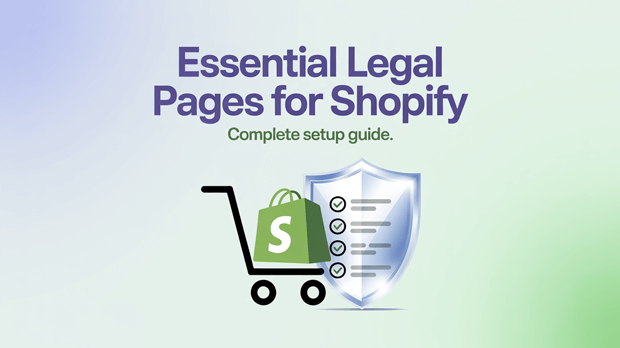
1. Privacy Policy
A Privacy Policy explains how your store collects, uses, and protects customer data.
It’s essential under laws like the General Data Protection Regulation (GDPR) in Europe and the California Consumer Privacy Act (CCPA) in the U.S.
What to Include:
- Types of data collected (e.g., IP addresses, cookies, form submissions)
- Purpose of data collection
- Third-party services used (e.g., Facebook Pixel, Google Analytics)
- User rights (opt-out, delete data, etc.)
- Contact information for data requests
Over 79% of consumers won’t complete a purchase if they don’t trust how their data is handled [Cisco Consumer Privacy Survey – 2023].
💡 Tip: Use Shopify’s built-in Privacy Policy generator or customize a template from platforms like Termify or LegalZoom.
2. Terms of Service (TOS)
Your Terms of Service outline the rules users agree to when visiting or purchasing from your store. This page helps protect your business from misuse, fraud, and unauthorized returns.
What to Include:
- Acceptable use of your site
- Order processing and cancellation policies
- Intellectual property rights
- Limitation of liability
- Dispute resolution clauses
Businesses with clear TOS agreements report up to 30% fewer disputes with customers [American Bar Association].
💡 Tip: Tailor your TOS based on your product type and shipping policies. If you sell digital goods, include licensing terms.
3. Refund and Return Policy
A well-written Refund and Return Policy sets expectations and reduces buyer anxiety. It’s also required by Shopify and many payment processors like PayPal and Stripe.
What to Include:
- Timeframe for returns
- Conditions for eligibility (e.g., unused items, original packaging)
- Restocking fees (if any)
- How refunds are processed
Stores with clearly visible return policies see 15% higher conversion rates than those without [ Baymard Institute Cart Abandonment Report 2023 ].
💡 Tip: Make it easy to understand and display it prominently on your checkout and product pages.
4. Shipping Policy
Customers want to know when they’ll receive their orders. A detailed Shipping Policy improves transparency and reduces support tickets.
What to Include:
- Domestic and international shipping options
- Estimated delivery times
- Tracking number availability
- Responsibility for lost or damaged packages
💡 Tip: If you use third-party logistics (3PL), integrate their shipping details into your policy.
5. Contact Us Page
While not always considered “legal,” a Contact Us page is required by Shopify and many domain registrars. It provides a way for customers, partners, and authorities to reach you.
What to Include:
- Email address
- Physical address (especially important for EU-based stores under GDPR)
- Phone number (optional)
- Social media links
- Customer support hours
💡 Tip: Link your Contact Us page in the footer and header menus for maximum visibility.
6. Accessibility Statement (Optional but Recommended)
An Accessibility Statement shows your commitment to inclusivity and may be required under certain regional laws, such as the Americans with Disabilities Act (ADA) in the U.S.
What to Include:
- Efforts made to improve accessibility (e.g., alt text, screen reader compatibility)
- How users can report accessibility issues
- Compliance with standards like WCAG 2.1
The global disabled population represents over 1.3 billion people, many of whom shop online regularly [ World Health Organization – Disability and Health Fact Sheet – 2023 ].
💡 Tip: Use Shopify themes optimized for accessibility or install apps like AccessiBe to enhance usability.
Bonus Pages That Build Trust and Credibility
While not strictly legal, these pages help reinforce trust and reduce cart abandonment:
About Us: Share your brand story and values.
FAQ: Answer common questions and reduce support load.
Testimonials/Reviews: Showcase social proof and increase conversions.
Security Badges: Display SSL certificates, payment icons, and anti-fraud measures.
How to Create Legal Pages on Shopify: Step-by-Step
Shopify allows you to easily add or generate legal policies directly from your admin dashboard. While the platform offers customizable templates for key pages like Privacy Policy, Terms of Service, and Refund Policy, you can also create your own using HTML formatting.
Here’s how:
Go to Settings in your Shopify admin.
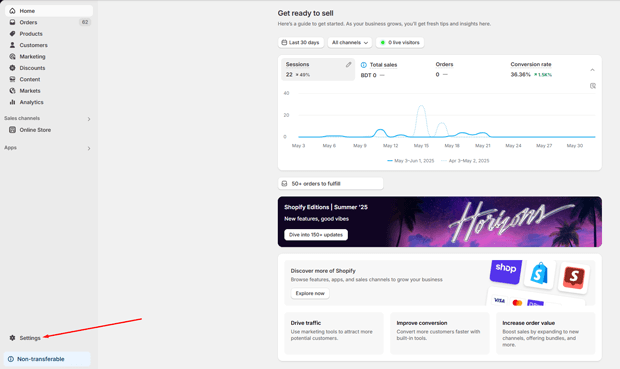
Navigate to the Policies option
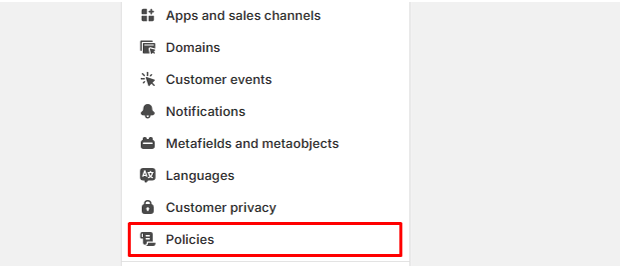
Under “Written policies,” select the policy you want to create (e.g., Privacy Policy).
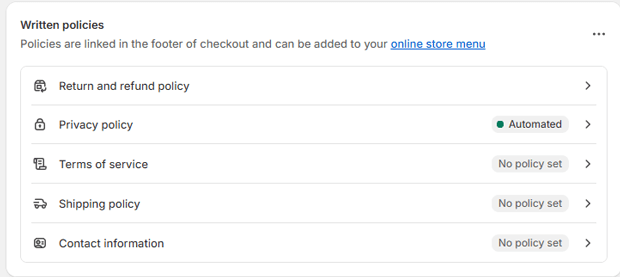
Click Insert template to use Shopify’s default version, or write your own.
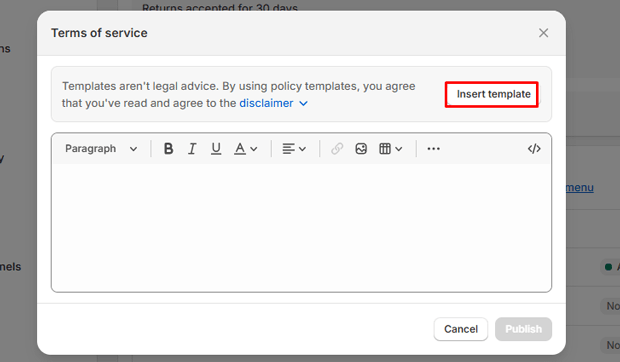
Use the rich text editor to format content, add links, or insert images.
Review and customize the policy to match your business practices. Click Publish it live.
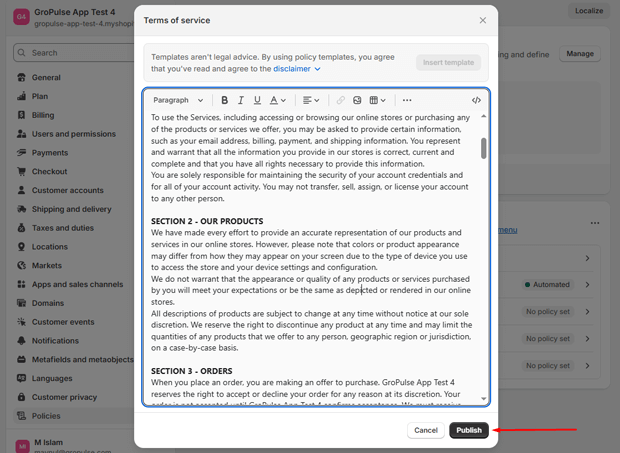
Once published, these policies are automatically linked in your checkout footer.
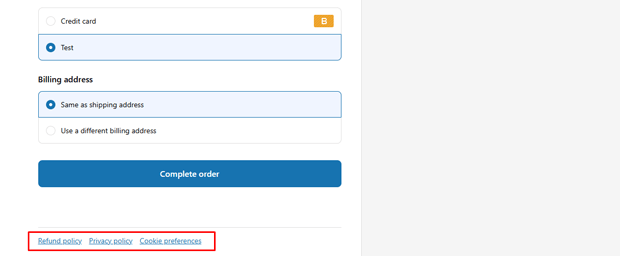
You should also add them to your store menus for better visibility.
To Add Policies to Your Store Menu:
- Go to Content > Menus.
- Select the menu you want to edit (e.g., Main menu or Footer menu).
- Click Add menu item , name the link (e.g., “Privacy Policy”), and search for the policy.
- Click Add , then Save menu .
You can also share direct links to your policies using standard URLs like:
- Privacy Policy:
yourstore.com/policies/privacy-policy - Terms of Service:
yourstore.com/policies/terms-of-service - Return Policy:
yourstore.com/policies/refund-policy - Shipping Policy:
yourstore.com/policies/shipping-policy
Multilingual Support
Shopify supports generating policies in multiple languages including French, Italian, and Spanish , ensuring compliance with regional regulations such as the GDPR.
⚠️ Always review your policies carefully before publishing while Shopify provides templates, you’re legally responsible for ensuring accuracy and compliance with applicable laws.
Free Legal Page Templates for Shopify Stores
Here are some trusted sources for customizable legal templates:
1. Shopify Legal Page Generator: Built-in tool for quick setup.
2. Termify.io: AI-powered generator tailored to your store type.
3. Formswift: Offers editable templates reviewed by attorneys.
⚠️ Always review templates for accuracy and adjust based on your business model and jurisdiction.
Tools to Automate Legal Compliance on Shopify
1. Privy: Helps manage email marketing and pop-up forms while ensuring GDPR compliance.
2. AccessiBe: Automates web accessibility adjustments for ADA and WCAG compliance.
5. Termzy ‑ I Agree To Terms: Easily add a T&C checkbox to your Shopify cart, checkout, login, register, and contact pages fully customizable.
Common Mistakes to Avoid When Setting Up Legal Pages
- Copying another store’s legal pages verbatim (copyright infringement risk)
- Using outdated language that doesn’t reflect current laws
- Hiding legal pages deep within the site
- Forgetting to update policies after major changes (e.g., new shipping provider)
How Legal Pages Impact SEO and Customer Trust
Google rewards sites that provide transparent, authoritative, and trustworthy content. Having complete legal pages contributes to:
- Higher E-E-A-T (Experience, Expertise, Authority, Trust)
- Lower bounce rates
- Increased dwell time
- Better mobile experience (if pages are responsive)
Also, customers are more likely to buy from stores that appear professional and responsible.
Shopify Legal Pages Checklist
- Privacy Policy
- Terms of Service
- Refund & Return Policy
- Shipping Policy
- Contact Us
- Accessibility Statement (recommended)
- Linked in footer/header
- Reviewed for legal accuracy
- Updated regularly
Frequently Asked Questions
Is a Privacy Policy required for Shopify stores?
Yes, Shopify requires all stores to have a Privacy Policy, especially if you collect customer data via checkouts, newsletters, or cookies.
Do I need a lawyer to write my Shopify legal pages?
While Shopify offers templates, consulting a lawyer ensures full compliance, especially if you operate internationally or sell regulated products.
Can I copy another store’s legal pages?
No, copying legal content can lead to copyright issues and may not accurately reflect your business practices.
Where should I link my legal pages?
Place links in your footer, checkout page, and on relevant product or landing pages (e.g., newsletter signups).
How often should I update my legal pages?
At least once a year or whenever there’s a change in your business operations, such as a new payment processor or shipping method.
Are legal pages important for SEO?
Yes, having comprehensive legal pages improves E-E-A-T and signals to Google that your site is credible and user-focused.
Conclusion: Don’t Skip Legal Pages , Protect Your Shopify Business
Setting up your Shopify legal pages isn’t just a box-ticking exercise. It’s a foundational step in building a trustworthy, compliant, and scalable online business.
From protecting yourself against legal risks to boosting customer confidence and SEO performance, these pages play a critical role in your store’s long-term success.
By following this guide and using the tools and templates provided, you’ll not only meet Shopify’s requirements but also stand out as a responsible and reliable brand in a competitive marketplace.
Now go ahead , audit your store, create those legal pages, and give your customers peace of mind.



